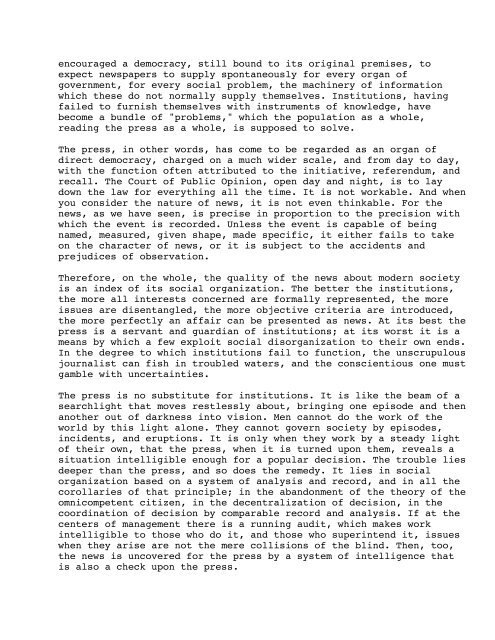PUBLIC OPINION by WALTER LIPPMANN TO FAYE LIPPMANN ...
PUBLIC OPINION by WALTER LIPPMANN TO FAYE LIPPMANN ...
PUBLIC OPINION by WALTER LIPPMANN TO FAYE LIPPMANN ...
Create successful ePaper yourself
Turn your PDF publications into a flip-book with our unique Google optimized e-Paper software.
encouraged a democracy, still bound to its original premises, to<br />
expect newspapers to supply spontaneously for every organ of<br />
government, for every social problem, the machinery of information<br />
which these do not normally supply themselves. Institutions, having<br />
failed to furnish themselves with instruments of knowledge, have<br />
become a bundle of "problems," which the population as a whole,<br />
reading the press as a whole, is supposed to solve.<br />
The press, in other words, has come to be regarded as an organ of<br />
direct democracy, charged on a much wider scale, and from day to day,<br />
with the function often attributed to the initiative, referendum, and<br />
recall. The Court of Public Opinion, open day and night, is to lay<br />
down the law for everything all the time. It is not workable. And when<br />
you consider the nature of news, it is not even thinkable. For the<br />
news, as we have seen, is precise in proportion to the precision with<br />
which the event is recorded. Unless the event is capable of being<br />
named, measured, given shape, made specific, it either fails to take<br />
on the character of news, or it is subject to the accidents and<br />
prejudices of observation.<br />
Therefore, on the whole, the quality of the news about modern society<br />
is an index of its social organization. The better the institutions,<br />
the more all interests concerned are formally represented, the more<br />
issues are disentangled, the more objective criteria are introduced,<br />
the more perfectly an affair can be presented as news. At its best the<br />
press is a servant and guardian of institutions; at its worst it is a<br />
means <strong>by</strong> which a few exploit social disorganization to their own ends.<br />
In the degree to which institutions fail to function, the unscrupulous<br />
journalist can fish in troubled waters, and the conscientious one must<br />
gamble with uncertainties.<br />
The press is no substitute for institutions. It is like the beam of a<br />
searchlight that moves restlessly about, bringing one episode and then<br />
another out of darkness into vision. Men cannot do the work of the<br />
world <strong>by</strong> this light alone. They cannot govern society <strong>by</strong> episodes,<br />
incidents, and eruptions. It is only when they work <strong>by</strong> a steady light<br />
of their own, that the press, when it is turned upon them, reveals a<br />
situation intelligible enough for a popular decision. The trouble lies<br />
deeper than the press, and so does the remedy. It lies in social<br />
organization based on a system of analysis and record, and in all the<br />
corollaries of that principle; in the abandonment of the theory of the<br />
omnicompetent citizen, in the decentralization of decision, in the<br />
coordination of decision <strong>by</strong> comparable record and analysis. If at the<br />
centers of management there is a running audit, which makes work<br />
intelligible to those who do it, and those who superintend it, issues<br />
when they arise are not the mere collisions of the blind. Then, too,<br />
the news is uncovered for the press <strong>by</strong> a system of intelligence that<br />
is also a check upon the press.





